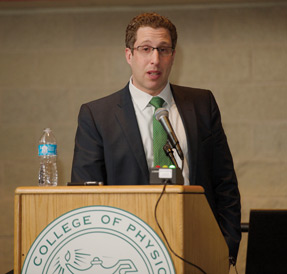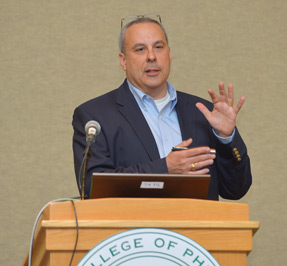Get rid of GERD without unneeded costs, tests
Gastroesophageal reflux disease can be diagnosed in the office, without the need for expensive tests such as endoscopy. Learn how to make the right diagnosis while avoiding confounding symptoms that might steer a patient toward the wrong specialist.
It's possible to diagnose and treat gastroesophageal reflux disease (GERD) without spending a lot of money, Seth Gross, MD, reassured attendees at a precourse on gastroenterology during Internal Medicine 2014, held in Orlando, Fla., in April.
“Many times we can make the diagnosis of gastroesophageal reflux disease just in the office,” said Dr. Gross, an assistant professor of medicine in the division of gastroenterology at New York University. “With a cost-conscious approach, we're going to really try to minimize how often we use endoscopy.”

The diagnostic process usually begins when a patient presents with symptoms. Most people are personally familiar with the most common symptoms of heartburn and regurgitation. “Everybody gets physiologic reflux, where after you eat a heavy meal, you may have some symptoms but they're not persistent,” said Dr. Gross. GERD can also present as chest pain, in which case “you always want to make sure there's not an underlying cardiac disease,” Dr. Gross said.
Some patients can be trickier, presenting with extraesophageal symptoms. “There's laryngitis, throat clearing, asthma, globus ... sometimes this is the only symptom,” he said.
Such cases initially may lead patients to the wrong specialist and testing. “When a patient has a chronic cough or throat clearing with globus, they'll go to the ear, nose, and throat [ENT] physician, they'll have a laryngoscopy and they'll see some irritation or inflammation ... and the patient's told that they have acid reflux,” said Dr. Gross.
That diagnosis is not necessarily correct. “Laryngoscopies in regular healthy individuals have findings that you would see with patients with gastroesophageal reflux disease,” he said. “The diagnosis of GERD based on a laryngoscopy for pharyngitis is definitely not enough.”
A medication trial, with proton-pump inhibitors (PPIs), should usually be the diagnostic strategy for GERD. “If someone doesn't have alarm symptoms, and you're not concerned that they have an underlying cardiac condition, a simple trial of empiric PPIs could be very effective. It can confirm the diagnosis and establish GERD and lead to a treatment to make your patient feel much better,” said Dr. Gross. Alarm symptoms include difficulty swallowing, unintentional weight loss, vomiting, and blood, and they indicate a need for endoscopy.
There are a number of tests that assess the state of the esophagus, but they are not typically appropriate for diagnosing GERD. “All these tests, they all come with a cost. It's important to put that into perspective when we're seeing our patients,” said Dr. Gross.
He presented a chart of the costs of various diagnostic methods, ranging from $17 a month for an inexpensive PPI to $1,500 for ambulatory reflux monitoring, up to $2,300 to $3,500 for an endoscopy or esophageal biopsy, depending on whether it's performed in an office or hospital. Some other expensive options, such as barium swallow tests and manometry, should definitely not be used to diagnose GERD, he noted.
If a medication trial is unsuccessful, verify that the patient followed the proper protocol. “[Mistakes include] they'll take it when heartburn starts. They'll take it between meals. We know that the way that these medications work best is if they take them 30 to 60 minutes prior to the meal, and ideally, the first meal of the day,” said Dr. Gross. If treatment still doesn't work, you may try a different PPI (although all have the same mechanism of action) or increase in dose.
And if none of that works, and the patient has atypical GERD symptoms, like cough, consider whether the problem could possibly be coming from some other part of the body. “We may send them first to the ENT, the pulmonologist, the allergist, and if there's a condition found in any of those evaluations, then you would treat that,” he said.
Some patients may have GERD but require additional testing to diagnose it. “If a person has typical symptoms and they did not respond to a proton-pump inhibitor, then that's when you would consider upper endoscopy,” said Dr. Gross.
The next step in testing after endoscopy would be reflux monitoring. “If you've put someone on a medication once a day, and they've been on it for several weeks—upwards of 8 weeks—or you increase their dose to twice a day and they're still not getting benefit, then something to think about, to offer ambulatory pH testing to see why they're not responding to medication,” said Dr. Gross.
The good news is that this testing has gotten much easier on patients. “The technology has improved, so patients don't need to walk around with a pH probe coming out of their nose,” said Dr. Gross. Instead, a small wireless probe is inserted during endoscopy, and for the next 96 hours, it transmits images to a cell-phone-like box that the patient wears on the hip. Patients should be off PPIs during the test.
Treatment tips
Once GERD is diagnosed, lifestyle changes should be recommended. “Just losing 5 to 10 pounds can make a tremendous difference in someone who's overweight. Raising the head of the bed—there's been some good evidence that suggests doing that,” said Dr. Gross. Also, advise patients to not lie down within a couple of hours of eating heavily.
Patients don't necessarily have to avoid all their favorite foods, though. “My patients come in with laundry lists of foods they have eliminated. Oftentimes, when I ask them, ‘Did the food you eliminated help your symptoms?’ they say no,” said Dr. Gross.
The answer to that question should be the determinant of whether a patient needs to avoid a specific food. “Sometimes patients need to keep a food diary to really figure out the foods that bother them,” he said. “Not everybody has to avoid spicy foods. Not everybody has to avoid orange juice or tomato-based foods.”
Avoiding tobacco and alcohol has also not been proven to reduce acid reflux. “There are of course other reasons to cut those things out,” noted Dr. Gross.
If lifestyle changes aren't enough, and symptoms resume after the end of the PPI trial, the patient may need to be on long-term therapy. This is another point to be cost-conscious.
“I'm sure you've all heard your patients complain about the cost of these medications. It's staggering how it can go from $17 all the way up to $240 [per month]. More expensive doesn't mean better. You could get away with some basic omeprazole over the counter and that can actually be life-changing for a patient and that's all they need,” he said.
Taking medication less frequently, every other day or even just a few times a week, may also save money while controlling a patient's symptoms, as long as he or she doesn't have complications like severe esophagitis or Barrett's esophagus.
“It's not like other conditions where you have to be on it every day for the rest of your life,” said Dr. Gross. “This is a kind of shift in what we used to do several years ago, where we would maintain people on long term PPI, maybe even at a high dose, maybe even twice a day ... To do on-demand or intermittent therapy is certainly a good and reasonable approach.”
Lower doses may also alleviate concerns about PPI side effects. A connection between hip fracture and PPI has been suggested by the research literature, but the association isn't certain enough that the medication needs to be contraindicated in all patients with osteoporosis, in Dr. Gross's opinion. “It's important then to have that conversation with that patient, but I have not seen a rash of hip fractures in my practice,” he said.
Increases in risk of Clostridium difficile and pneumonia are also possible concerns in PPI patients. “If they are started on a PPI, and then they develop pneumonia, it's important to get a sense of the timing between the two,” Dr. Gross said.
But you don't have to worry about timing with clopidogrel, as it's no longer thought that the blood thinner needs to be taken at a different time of day from a PPI. “There have been some new studies,” said Dr. Gross. “There are no special instructions for patients. You can be on both medications and it's overall felt to be safe.”
Alternatives
For various reasons, PPIs may not be the complete solution to GERD for some patients, in which case, the next line of treatment is histamine H2-receptor antagonists. “Some patients are intolerant of proton-pump inhibitors, or some patients are responsive but they don't want to be on it twice a day,” he said. “I have many patients that take a PPI in the morning and they may take an H2 receptor antagonist at night.”
Other medications should be reserved for rare cases. For example, metoclopramide can treat severe acid reflux, especially in patients who also have gastroparesis, but a major side effect concern is tardive dyskinesia. “It's important to confirm that they benefit from a medication like that, because there is a black box warning. I always have a long conversation with my patients about metoclopramide,” said Dr. Gross.
Baclofen may be helpful to patients with laryngopharyngeal reflux, but there's no reason to use sucralfate for GERD in nonpregnant patients, he advised. For patients who are pregnant, it's safe to take PPIs.
Surgical therapy, such as laparoscopic fundoplication, can be an option, but perhaps perversely, it works best in patients whose GERD responds to medication. “Oftentimes the patients I meet who are asking for surgical therapy are those that don't respond to medication,” said Dr. Gross. Patients who don't respond to PPIs may not see any improvement in their symptoms from surgery, plus they could develop new issues, including bloating and difficulty swallowing.
If the patient expressing interest in surgery to treat acid reflux is obese, you may want to suggest bariatric surgery as a possible alternative. “We know that weight loss certainly improves symptoms,” he said.
In a few years, there may be additional surgical treatment options for GERD, but they're still in the experimental stage. “Endoscopy-based therapies—it's an exciting space,” Dr. Gross said. “[There have] been some devices that stitch up and tighten the lower esophageal sphincter ... but currently we don't have one endoscopic therapy that we would recommend for patients.”
But, for most cases, treatment can be much simpler. “If someone has upper GI [gastrointestinal] symptoms and it's suggestive of GERD symptoms, and they don't have alarm symptoms, it's completely reasonable to just treat them with a PPI, have them follow up in a few weeks, and oftentimes that will do the trick,” concluded Dr. Gross.



